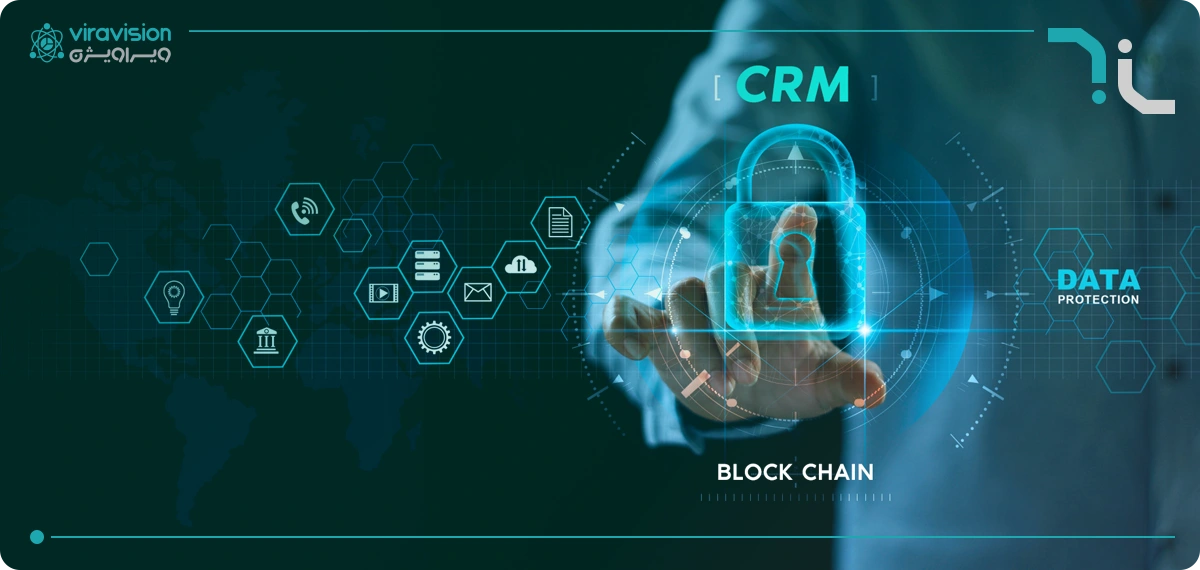Blockchain in CRM : Revolutionizing Customer Data Security

Blockchain in Customer Relationship Management (CRM); A Revolution in Data Security
Why is Customer Data Security Important in CRM?
In today’s digital world, where competition among businesses is intense, customer data security has become a top priority for organizations. Customer Relationship Management (CRM) systems store vital information such as contact details, purchase history, preferences, and customer behaviors. Unauthorized access or data breaches can not only erode customer trust but also severely impact the organization’s reputation and credibility. This may result in losing customers as well as legal penalties for violating data protection regulations. Therefore, maintaining the security of customer data in CRM is not only crucial for improving organizational performance but also plays a key role in sustainable business growth. Essentially, CRM without effective security is just a vulnerable database with the potential to create crises.
The Role of Blockchain Technology in Enhancing CRM Security
Blockchain technology, with its unique features, can fundamentally transform the security of CRM systems. Blockchain acts as a distributed and immutable ledger where data is recorded in encrypted chains. This technology enables secure data storage without the need for a central server, significantly reducing the risk of hacking and data tampering. Additionally, any change in the data is only possible with the consensus of network members, ensuring that no single individual or entity can alter information alone. Integrating blockchain into CRM not only enhances security but also increases customer trust and establishes a foundation for stronger, long-term relationships. Moreover, the ability to record accurate and immutable customer interactions greatly aids data-driven decision-making.
Benefits of Blockchain in Customer Management and Data Protection
Blockchain offers numerous advantages for customer management and data protection. One of the key benefits is the elimination of centralized data storage. In traditional systems, data is stored on central servers, which exposes it to security risks. In blockchain, data is stored in a distributed and encrypted manner, reducing the likelihood of breaches and theft. Another benefit is the precise tracking of any changes to customer information, creating transparency and increasing trust. Additionally, smart contracts in blockchain can automate and secure processes related to customer data management. All these advantages make blockchain a powerful tool for safeguarding customer information and improving CRM system performance.

Maintaining Privacy in CRM Using Blockchain
Challenges of Customer Privacy in Traditional CRM Systems
In traditional CRM systems, maintaining customer privacy has always been a significant concern. Personal data is usually stored in centralized databases, which, if breached, can expose sensitive customer information. Moreover, many traditional CRM systems do not provide customers with sufficient control over how their data is used. This not only raises security concerns but also reduces customer trust. With the rise of data protection regulations such as GDPR, there is an increasing need for systems that prioritize privacy. Without a transparent and reliable framework, customer privacy can easily be violated.
How Blockchain Strengthens Customer Privacy
Blockchain, with its decentralized structure, can be an effective tool for enhancing customer privacy. Data is stored in a way that it can only be accessed with private keys, preventing any third party from accessing it without permission. Customers can also use smart contracts to control which information can be used, by whom, and for how long. This effectively returns control of data to the customer, increasing trust between them and the organization. Additionally, blockchain’s transparency minimizes misuse or tampering of customer data. Consequently, privacy in CRM reaches a level of protection that was not possible with traditional technologies.
Examples of Blockchain in Protecting Customer Data
The applications of blockchain in safeguarding customer data are expanding. For example, some companies use blockchain to create decentralized digital identities, allowing customers to verify their identity without revealing sensitive information. In financial services, some banks leverage blockchain to record transactions and customer interactions, ensuring greater transparency and security. Additionally, smart contracts can manage digital consent forms, enabling customers to modify or revoke access to their data at any time. These examples highlight blockchain’s central role in the future of customer data protection.

Enhancing CRM Security with Blockchain; A Novel Approach
Methods to Improve Customer Data Security with Blockchain
Enhancing customer data security with blockchain requires implementing specific solutions. One method is advanced encryption of data during recording and transmission, ensuring that even if unauthorized access occurs, the data cannot be read or misused. Decentralized authentication through blockchain minimizes identity fraud and human intrusion. Distributed storage prevents data from being concentrated in a single point, reducing the system’s overall vulnerability. Combined, these methods enhance customer trust and improve overall CRM performance.
Reducing the Risk of Data Breaches and Tampering in CRM with Blockchain
The risk of breaches and tampering is one of the greatest threats faced by CRM systems. Blockchain’s unique structure significantly mitigates this risk. Once data is recorded in blocks, it cannot be altered without the consensus of the majority of network nodes. This makes any changes traceable and virtually eliminates forgery or tampering. As such, blockchain acts as a powerful defense against cyberattacks. Companies using blockchain in their CRM benefit from higher security and gain greater customer trust.
The Future of Security and Privacy in CRM with Blockchain Technology
CRM is undoubtedly becoming intertwined with blockchain technology. As concerns over data security and privacy grow, organizations are seeking innovative solutions to protect customer information, and blockchain is one of the most reliable options. It is expected that blockchain-based CRM systems will soon become a standard across various industries. Moreover, combining blockchain with AI and machine learning can create intelligent and secure systems for analyzing customer behavior. Organizations that adopt this technology early will lead in building trust and customer satisfaction.
Conclusion
Given the numerous advantages of blockchain in security and privacy, incorporating this technology into CRM systems can be a pivotal step in digital transformation. Blockchain not only reduces security risks but also empowers customers to have greater control over their data. This fosters mutual trust, improves customer experience, and ultimately enhances loyalty. Therefore, investing in blockchain-enabled CRM is not merely a technological choice but a long-term strategic move for organizational success.







